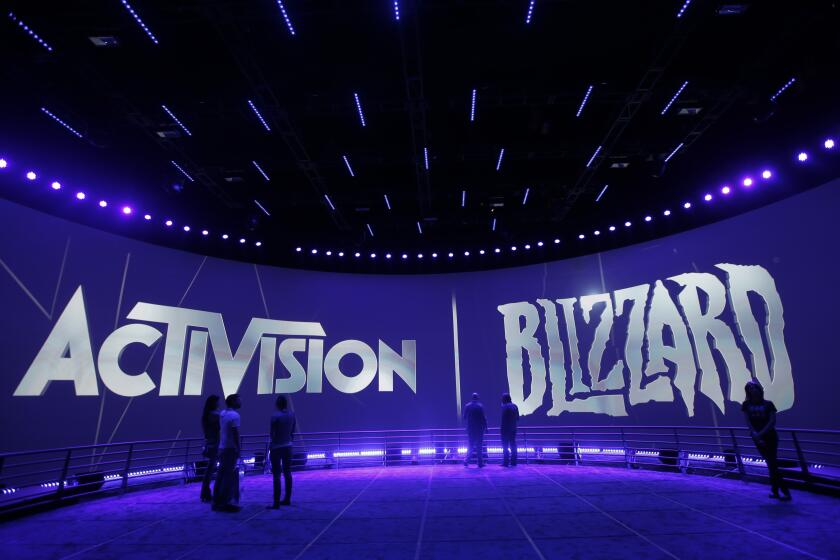First Republic falls more, tech rallies

- Share via
Wall Street fell again Wednesday, though a rally for Microsoft and other Big Tech stocks helped to limit the losses.
The Standard & Poor’s 500 dropped 15.64 points, or 0.4%, to 4,055.99. The Dow Jones industrial average fell 228.96 points, or 0.7%, to 33,301.87, while the Nasdaq composite led the market with a gain of 55.19 points, or 0.5%, to 11,854.35.
Wall Street was coming off its worst day in a month, hurt by concerns about the strength of U.S. banks. The spotlight has been harshest on First Republic Bank, which lost an additional 29.8% after nearly halving the day before. That’s when it gave details about how many customers bolted amid last month’s turmoil in the industry.
The worry is that it and other smaller and midsize banks could suffer debilitating runs of deposits from customers, similar to the ones that caused last month’s failures of Silicon Valley Bank and Signature Bank. Even without more shutdowns, the industry’s struggles could cause a pullback in lending by banks that saps the economy.
PacWest Bancorp., another bank that’s been in investors’ spotlight, rose 7.5% after reporting stronger results than expected and saying that its deposits have grown since late March. That may offer optimism that First Republic’s struggles could be specific to itself, rather than a symptom of deeper issues with the system.
Also dropping sharply Wednesday was Enphase Energy, which fell 25.7% despite reporting stronger profit and revenue for the latest quarter than forecast. Analysts pointed to its revenue forecast for the current quarter, which fell short of some expectations.
The majority of companies have topped expectations so far this reporting season, but the low bar set for them has many investors paying more attention to what CEOs say about upcoming trends than results for the first three months of the year.
Activision Blizzard, meanwhile, tumbled 11.4% after British regulators blocked its takeover by Microsoft on concerns it would hurt competition in the cloud gaming market.
British regulators block Microsoft’s $69-billion deal to buy video game maker Activision Blizzard over worries that it would stifle competition.
Although the majority of stocks fell, gains for Microsoft and other Big Tech companies prevented a sharper slide for the market.
Microsoft rose 7.2% after reporting stronger profit for the first three months of the year than analysts expected. It carries a huge weight on the S&P 500 because it’s the second-largest stock in the index.
Tech stocks have broadly been some of the year’s best performers so far as they’ve laid off workers and made other cost cuts to improve their profitability. Hopes for a coming pause from the Federal Reserve on its barrage of interest rate increases have also helped them in particular.
Google’s parent company, Alphabet, also turned a bigger profit than expected. But its stock slipped 0.2% after drifting between gains and losses through the day. It reported its first back-to-back drops in advertising revenue from a year earlier since it became a publicly traded company in 2004.
More Big Tech companies are scheduled to follow with their own reports soon. Facebook’s parent company, Meta Platforms, rose 0.9% ahead of its report. It jumped in after-hours trading after it said it earned more than expected.
Chipotle Mexican Grill rose 12.9%, the biggest gain in the S&P 500, after reporting stronger profit than expected. It was one of a few companies that raised hopes consumer spending could remain resilient despite a slowing economy. That’s key because it makes up the bulk of the U.S. economy.
Stocks have been mostly listless in recent weeks, as Wall Street struggles with several questions. With few answers imminent, Mark Haefele, UBS Global Wealth Management’s chief investment officer, expects stocks to stay stuck in a range.
Investors are worried about the possibility of a recession this year and stocks look relatively expensive, he said. That means “the scope for upside appears limited, in our view,” he said.
Scott Wren, senior global market strategist at Wells Fargo Investment Institute, sees the S&P 500 largely remaining within a range of 3,700 to 4,200 this year. It’s in the top half of that range, and he said he’s not looking to “chase this equity rally.”
Critics of the government response to the Silicon Valley Bank collapse say it’s a taxpayer-funded bailout. They’re wrong.
All banks are contending with much higher interest rates, which have tightened the screws on the economy and financial markets after flying higher over the last year.
The Federal Reserve has raised its key overnight interest rate to its highest level since 2007. It’s trying to rein in high inflation, but its main tool to do so is a notoriously blunt one. High rates slow the entire economy and hurt prices for investments.
That has many investors and economists preparing for a possible recession. Besides the cracks in the banking system, high rates have already slowed the housing, manufacturing and other markets. The job market, meanwhile, remains relatively solid.
A report on Wednesday showed that orders for long-lasting manufactured goods were stronger in March than expected.
In the bond market, the yield on the 10-year Treasury rose to 3.43% from 3.40% late Tuesday. It helps set rates for mortgages and other loans. The two-year Treasury yield, which more closely tracks expectations for the Fed, fell to 3.92% from 3.95% late Tuesday.
More to Read
Inside the business of entertainment
The Wide Shot brings you news, analysis and insights on everything from streaming wars to production — and what it all means for the future.
You may occasionally receive promotional content from the Los Angeles Times.












